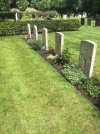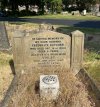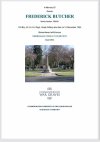-
Welcome to this forum . We are a worldwide group with a common interest in Birmingham and its history. While here, please follow a few simple rules. We ask that you respect other members, thank those who have helped you and please keep your contributions on-topic with the thread.
We do hope you enjoy your visit. BHF Admin Team
You are using an out of date browser. It may not display this or other websites correctly.
You should upgrade or use an alternative browser.
You should upgrade or use an alternative browser.
War Graves
- Thread starter Morturn
- Start date
As far as I know, the majority of the bodies of those who died fighting in WW1 and WW2 weren't brought home. In fact I think there was a policy to not bring them home. If families wanted them home, they would have had to pay for it themselves.
Perhaps those at Brandwood died in this country, having been brought home injured and being nursed in hospital ?
Perhaps those at Brandwood died in this country, having been brought home injured and being nursed in hospital ?
pjmburns
master brummie
A post on the Great War forum
Repatriation from a war zone was banned from mid-1915. Prior to that time only a handful of officers were repatriated to the UK due to relatives having to pay the cost. The ban was put in place mainly because of the logistical, health and morale problems the return of thousands of bodies would create. The cost would have been irrelevant as it would be borne by the relatives - presumably.
It would be interesting to know the dates on any of the "isolated" stones.
I know I have a great uncle who died back here (at Uffculme) and is buried at Lodge Hill. He is separate from other war graves but I believe his family refused a stone (certainly there is no stone of any sort on the grave) so I am not sure if that is the reason why.
Repatriation from a war zone was banned from mid-1915. Prior to that time only a handful of officers were repatriated to the UK due to relatives having to pay the cost. The ban was put in place mainly because of the logistical, health and morale problems the return of thousands of bodies would create. The cost would have been irrelevant as it would be borne by the relatives - presumably.
It would be interesting to know the dates on any of the "isolated" stones.
I know I have a great uncle who died back here (at Uffculme) and is buried at Lodge Hill. He is separate from other war graves but I believe his family refused a stone (certainly there is no stone of any sort on the grave) so I am not sure if that is the reason why.
Last edited:
After WW2 the War Graves commission moved a lot of bodies from scattered locations across the UK to be reburied. There were two reasons 1. To make the tending of the graves easier for the Commission. 2. To move the graves closer to where their families lived, to make it easier for their loved ones to visit. Many graves were moved in "batches" that led to these groupings in churchyards. These would have been servicemen and women who had died from accidents or of their wounds in hospital or aircrew who had crashed in the UK or seamen who had been washed ashore.
In general, British servicemen who died abroad in both World Wars were buried abroad - "There is a corner of a foreign field... " - again, the bodies were gathered together by the War Graves Commission and reburied in large cemeteries to make tending them easier.
It was only in more recent wars, where there was a real danger of the graves being desecrated after our troops had left, that the MOD began shipping bodies home for burial. Although a lot of British families chose to have their loved ones buried in the Falkland Islands after the conflict there.
In general, British servicemen who died abroad in both World Wars were buried abroad - "There is a corner of a foreign field... " - again, the bodies were gathered together by the War Graves Commission and reburied in large cemeteries to make tending them easier.
It was only in more recent wars, where there was a real danger of the graves being desecrated after our troops had left, that the MOD began shipping bodies home for burial. Although a lot of British families chose to have their loved ones buried in the Falkland Islands after the conflict there.
Last edited:
The Social History Society has a post on British war graves located in the UK.
https://socialhistory.org.uk/shs_exchange/war-graves-in-the-united-kingdom/
The Commonwealth War Graves Commission has details of graves at Brandwood End. https://www.cwgc.org/visit-us/find-...ails/45002/birmingham-brandwood-end-cemetery/
https://socialhistory.org.uk/shs_exchange/war-graves-in-the-united-kingdom/
The Commonwealth War Graves Commission has details of graves at Brandwood End. https://www.cwgc.org/visit-us/find-...ails/45002/birmingham-brandwood-end-cemetery/
Keith R
master brummie
My Wifes Great uncle died in Selly Oak Hospital in 1944 and is in a CWGC grave at Yardley......in amongst " ordinary" graves. I think they visit them now and then making sure they are presentable. We had put a message on the grave and it was gone next time we visited and since then I have read the Commision removes this type of thing. The grave surround had collapsed a bit as his wife was interned her in 1990 and it disturbed things.I have tidied the sides and still a bit more to do. We tried to find out why he has a grave as he seems to have died from a Kidney thing and maybe not connected with any "action" but so far no records forthcoming.
Attachments
Keith R
master brummie
This is a Memorial for him from the Commision and the grave details and number match the grave in my picture.My understanding was that all CWGC gravestones are identical to those shown in post #1.
It looks as if the family put their own stone
Attachments
Good man for trying to make it look right, regardless of how he died. I offered my services at tidying up the graves at the local church, they said they'd rather have the wild life. I think an untidy graveyard, is having no regard for those therein. Times change I Know, when I first moved here 40 yrs ago, there was a local who always kept th graveyard tidy. When he cut the grass, he used to say, "Come on, pick your feet up, I'm not cutting toenails today"My Wifes Great uncle died in Selly Oak Hospital in 1944 and is in a CWGC grave at Yardley......in amongst " ordinary" graves. I think they visit them now and then making sure they are presentable. We had put a message on the grave and it was gone next time we visited and since then I have read the Commision removes this type of thing. The grave surround had collapsed a bit as his wife was interned her in 1990 and it disturbed things.I have tidied the sides and still a bit more to do. We tried to find out why he has a grave as he seems to have died from a Kidney thing and maybe not connected with any "action" but so far no records forthcoming.
Last edited:
pjmburns
master brummie
Yes - I saw that entry but was surprised to see an "ordinary" grave if I can put it like that.This is a Memorial for him from the Commision and the grave details and number match the grave in my picture.
Not detracting from the sacrifice he made. We owe so much to men like him.
hi keith i have heard of having to wait for a year or so but over 2 years does seem a tad too long to me..could be an idea to contact them and ask for an updateYes its strange and I sent off all the documents to get his records but over 2 years now so think I wont get any now.
lyn
I had given up after 5 yearshi keith i have heard of having to wait for a year or so but over 2 years does seem a tad too long to me..could be an idea to contact them and ask for an update
lyn
they never got back to me about my Uncle



